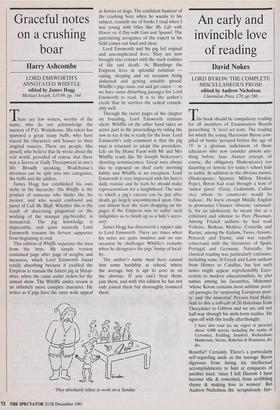Graceful notes on a crushing boar
Harry Ashcombe
LORD EMSWORTH'S ANNOTATED WHIFFLE edited by James Hogg Michael Joseph, £10.99, pp. 144 here are few writers, worthy of the name, who do not acknowledge the mastery of P.G. Wodehouse. His talent has spawned a great many buffs, who have traced his characters and houses to their original sources. There are people, like myself, who believe that he wrote about the real world, provided of course that there was a Jeeves or Gaily Threepwood in one's life. Broadly speaking, Wodehouse's devotees can be split into two categories, the buffs and the addicts.
James Hogg has established his own niche in the hierarchy. His Whiffle is the product of someone who thinks like his mentor, and who would confound any panel of Call My Bluff. Whether this is the result of discerning plagiarism or the working of the manqué pig-breeder, is immaterial. The pig knowledge is impeccable, and quite naturally Lord Emsworth remains his fervent supporter from beginning to end.
This edition of Whiffle separates the men from the boys. My simple version contained page after page of weights and measures, which Lord Emsworth found totally absorbing because it enabled the Empress to remain the fattest pig in Shrop- shire, when she came under orders for the annual show. The Whiffle under review is an infinitely more complex character. He writes as if pigs have the same wide appeal as horses or dogs. The confident humour of the crashing bore when he warms to his subject, reminds me of books I read when I was young with titles like My Life with Horses or A Day with Gun and Spaniel. The patronising arrogance of the expert in his field comes out loud and clear.
Lord Emsworth and his pig led virginal and uncomplicated lives. They are now brought into contact with the stark realities of life and death. At Blandings the Empress lives in splendid isolation eating, sleeping and on occasion being abducted and getting amiably pissed. Whiffle's pigs mate, eat and get eaten — so we have some disturbing passages for Lord Emsworth to read. It is to the author's credit that he survives the ordeal remark- ably well.
Through the racier pages of the chapter on breeding, Lord Emsworth remains silent. Whiffle on the other hand takes an active part in the proceedings by riding the sow to see if she is ready for the boar. Lord Emsworth's only comment is that his pig man is reluctant to adopt this procedure. Life on the Home Farm with Mr and Mrs Whiffle reads like Sir Joseph Nickerson's shooting reminiscences. Great men always like to expound on their' early morning habits and Whiffle is no exception. Lord Emsworth is very impressed with his hero's daily routine and he feels he should make representations for a knighthood. The uses to which a pig's carcass can be put after death, go largely uncommented upon. One can almost hear the tears dropping on the pages if the Empress was to suffer such indignities as to finish up as a lady's acces- sory.
James Hogg has discovered a zippier side to Lord Emsworth. There are times when his notes are quite intuitive and on one occasion he challenges Whiffle's remarks when he denigrates the pigs' hump of local- ity.
The author's name must have caused him some hardship at school, where the average boy is apt to zero in on the obvious. If you can't beat them, join them, and with this edition he has not only joined them but thoroughly trounced them.
`They absolutely refuse to work on a Sunday.'










































































































 Previous page
Previous page